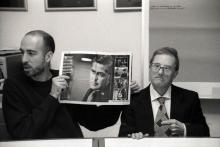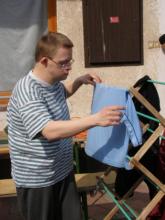INV
"What is essential is invisible to the eye"
Whom is “the essential is invisible to the eye (INV) for?
- INV is addressed to those who live and/or work with people with a (severe) intellectual disability.
What is INV all about?
- A pedagogical model, a conceptual framework for the relationship established between the professional and the person with intellectual disabilities.
Which are the main tools provided by INV?
- A handbook, which explains, through examples, the steps and phases of the relationship as well as its main features and potential enemies.
- A training itinerary, which foresees 5 training sessions and includes all training resources necessary to transfer the model.
- A self-observation protocol and a log book which should help the professionals in enforcing the pedagogical model in their everyday work.
- Other pedagogical tools.
What is INV’s origin?
- The INV project (October 2012–January 2015) has been financed by the European Commission in the framework of the Lifelong Learning Programme – Grundtvig, for adult education (GRUNDTVIG - GMP 527383–2012).
Funding disclaimer
This project has been funded with support from the European Commission. This publication reflects the views only of the author, and the Commission cannot be held responsible for any use which may be made of the information contained therein.
Professionals' comments on the INV model and tools:
- Participant No1 from Italy: The model helps you in finding a true educational relationship.
- Participant No2 from Italy: It allows you to analyse and understand the different situations in different ways, out of the routine, and it involves the professionals in a self-assessment during their daily job.
- Participant No3 from Italy: The model has given me "useful" food for thought and operational models that can be extended to various situations, in order to improve my work and the way I perceivemyself.
- Participant No1 from Barcelona: I have unconsciously created a space of reflection for my feelings when I intervene with the persons I work with. (...) I have questioned more things and I have shared them with the team of educators.
- Participant No2 from Barcelona: Reflecting about the relational aspects of the educational fact has been something new for me. I am not used to it. This brings up some aspects that depend on me and can be my responsibility. Moreover, it brings up an educational tool that can help improve my relationships and my professional quality. We need strategies, tools, resources… to know how to recognize and change our emotions and feelings.
- Mária from Hungary, Budapest: The self-observation register and the regular team-discussions made my work in the respite care home much easier and more efficient. My consciousness increased a lot, I can control my relationship to the intellectually disabled clients much better, and I understand many events, which remained unclear before. It is also interesting, that I can recognize the behaviour and mistakes of my colleges so clearly.
- Éva from Hungary: The case-discussions on the team-meetings provide me security and I learned how to speak and think about our relationship to seriously intellectually disabled persons.
- István from Hungary: We need more education and practice on the application of the model in the practice. After a few months application we can feel significant difference between staff members who have participated in the INV-testing and those who not. I am proud of owning this new skill. I hope that the INV model will be introduced in all 14 services of the Foundation and in other services providing organisations.








